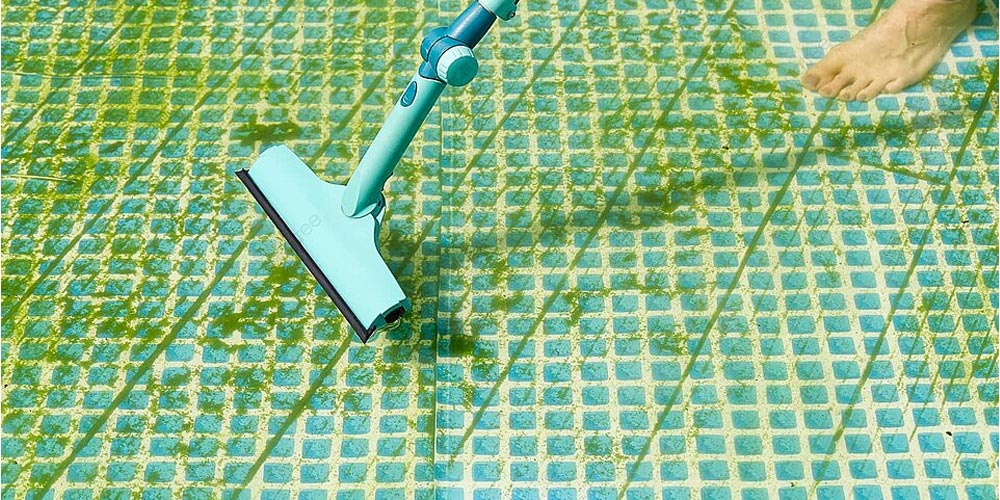Бассейндин жанында болуп, суунун булуттанып, жашыл түскө боёлуп калганын байкадыңыз беле? Же сүзүп жүргөндө бассейндин дубалдары тайгак болуп калганын сезесизби? Бул көйгөйлөрдүн баары балырлардын өсүшүнө байланыштуу. Суунун тунуктугун жана сапатын сактоо үчүн,Альгициддер(же балырлары) алмаштыргыс куралга айланды. Бул макала альгициддердин бардык аспектилерин терең түшүнүүгө, альгициддерди жакшыраак тандоого жана жеке бассейниңиздин суунун сапатын натыйжалуу сактоого жардам берет.
Бассейндин булуттуу суусу
Бассейндерде балырлардын өсүшү кеңири таралган көйгөй. Бул кичинекей өсүмдүктөр же бактериялар суудагы жарыктын жана азык заттардын таасири астында тез көбөйөт, бул суунун сапатынын начарлашына, кирдеп калышына жана башка патогендик микроорганизмдердин өсүшүнө алып келет. Суунун тунуктугун жана гигиенасын сактоо үчүн балырлардын өсүшүн көзөмөлдөө боюнча чараларды көрүшүңүз керек.
Альгициддер, адатта, суюк түрүндө сатылат. Бул каражаттарды колдонуу оңой, жөн гана таңгактагы көрсөтмөлөргө ылайык сууга кошуңуз. Натыйжалуу болушу үчүн, көпчүлүк альгициддерди үзгүлтүксүз колдонуу керек. Коомдук бассейн, үй-бүлөлүк бассейн, аквариум же бакчадагы көлмө болсун, альгициддер өз ишин аткара алат.
Рынокто альгициддердин көптөгөн түрлөрү бар, анын ичинде органикалык жана органикалык эмес, туруктуу же туруктуу эмес ж.б. Ар кандай суу чөйрөлөрү жана шарттары ар кандай альгициддерди талап кылышы мүмкүн, андыктан туура продуктуну тандоо өтө маанилүү. Мисалы, органикалык эмес альгициддер, адатта, бассейндерди кышка даярдоо үчүн ылайыктуу, ал эми органикалык альгициддер күнүмдүк колдонуу үчүн ылайыктуураак.
Алгициддин артыкчылыктары
1. Тез таасир этет: Көпчүлүк альгициддер сууга кошулгандан кийин кыска убакыттын ичинде таасир этет.
2. Суунун сапатын сактоо: Суунун сапатынын узак мөөнөттүү тунуктугун жана гигиенасын сактоого жардам берет.
3. Колдонууга оңой: Көрсөтүлгөндөй кошуңуз, атайын жабдуулар же көндүмдөр талап кылынбайт.
4. Үнөмдүү жана жеткиликтүү: Узак мөөнөттүү колдонуудан кийин, анын баасы салыштырмалуу төмөн.
Алгицидди колдонуудагы сактык чаралары
1. Нускамаларды окуп чыгыңыз: Продукциянын нускамаларын кылдаттык менен окуп чыгыңыз жана сунушталган колдонууну жана дозасын аткарыңыз.
2. Ашыкча колдонуудан алыс болуңуз: Жез альгициддеринин же төртүнчү аммоний салец альгициддеринин ашыкча дозасы көптөгөн көйгөйлөрдү жаратышы мүмкүн.
3. Сактоо коопсуздугу: Альгициддерди балдар жетпеген жерде, түз күн нурунан жана жогорку температуралуу чөйрөдөн алыс сактаңыз.
4. Үзгүлтүксүз тейлөө: Альгициддер колдонулган күндө да, бассейндин суусун тазалап, суунун сапатын үзгүлтүксүз текшерип туруу керек.
Альгициддерди сактоонун негизги ыкмалары
Колдонууну жана сактоону жеңилдетүү үчүн, альгициддер, адатта, желим бөтөлкөлөргө таңгакталат. Бул таңгактар продуктунун гигиенасын жана коопсуздугун камсыз кылуу менен бирге, колдонуучуларга өз муктаждыктарына жараша тийиштүү өлчөмдө колдонууга шарт түзөт.
Продукциянын эффективдүүлүгүн сактоо үчүн, альгициддерди күндүн нуру түз тийбеген салкын жерде сактоо керек. Продукцияны жогорку температурадагы чөйрөгө коюудан же аны күн нуруна түз тийгизүүдөн алыс болуңуз, анткени бул продуктунун сапатынын начарлашына же коркунуч туудурушуна алып келиши мүмкүн. Мүмкүн болгон химиялык реакциялардын же кайчылаш булгануунун алдын алуу үчүн сактоочу жайларды жакшы желдетүүгө аракет кылыңыз.
Жарыяланган убактысы: 2024-жылдын 7-майы


